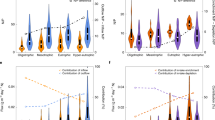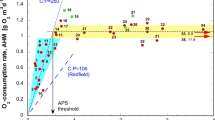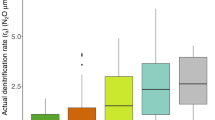Abstract
LAKES that have become acidified by airborne pollutants typically have low biological productivity and support an impoverished flora and fauna1. In their natural state, these lakes were poorly buffered, and had a pre-industrial pH on the acid side of neutral2. Although they can be neutralized by adding base, the resulting calcium-rich water supports plant and animal communities that are unlike those found in natural softwater lakes1. It is known, however, that the long-term buffering of soft waters can be appreciably influenced by their biological productivity3á¤-5. Here we report field-study results that show that by adding phosphate fertilizer to stimulate primary productivity, it is possible to generate sufficient base by the assimilation of nitrate to raise the pH of acid lake waters without drastically altering their community structure. Owing to the high efficiency of base production, only modest additions of phosphate are required, phytoplankton growth is not excessive and there is a marked increase in biological productivity at all trophic levels. In the longer term, additional quantities of base should be generated by the anoxic decomposition of organic material accumulating on the lake bed.
This is a preview of subscription content, access via your institution
Access options
Subscribe to this journal
Receive 51 print issues and online access
$199.00 per year
only $3.90 per issue
Buy this article
- Purchase on Springer Link
- Instant access to full article PDF
Prices may be subject to local taxes which are calculated during checkout
Similar content being viewed by others
References
Olem, H. Liming Acidic Surface Waters (Lewis, Michigan, 1991).
Schindler, D. W. Science 329, 149–156 (1988).
Kelly, C. A. et al. Biogeochemistry 3, 129–140 (1987).
Baker, L. A. & Brezonik, P. L. Wat. Resour. Res. 24, 65–74 (1988).
Davison, W. Schweiz. Z. Hydrol. 49, 186–201 (1987).
Schindler, D. W., Turner, M. A. & Hesslein, R. H. Biogeochemistry 1, 117–133 (1985).
Kelly, C. A., Rudd, J. W. M. & Schindler, D. W. Wat. Air Soil Pollut. 50, 49–61 (1990).
Davison, W., Hill, M., Woof, C., Rouen, M. & Aspinall, D. Wat. Res. 28, 161–170 (1994).
Imboden, D. M. & Lerman, A. in Lakes: Chemistry, Biology, Physics (ed. Lerman, A.) 341–356 (Springer, New York, 1978).
Dillon, P. J., Yan, N. D., Scheider, W. A. & Conroy, N. Arch. Hydrobiol. Beih. Ergebn. Limnol. 13, 317–336 (1979).
Davison, W. Trans. Instn Min. Metall. A99, A153–A157 (1990).
Jones, J. G. & Simon, B. M. J. Ecol. 68, 493–512 (1990).
Galloway, J. N., Schofield, C. L., Peters, N. E., Hendrey, G. R. & Altwicker, E. R. Can. J. Fish. aquat. Sci. 40, 799–806 (1983).
Stumm, W. Chemistry of the Solid-Water Interface (Wiley, New York, 1992).
Author information
Authors and Affiliations
Rights and permissions
About this article
Cite this article
Davison, W., George, D. & Edwards, N. Controlled reversal of lake acidification by treatment with phosphate fertilizer. Nature 377, 504–507 (1995). https://doi.org/10.1038/377504a0
Received:
Accepted:
Issue Date:
DOI: https://doi.org/10.1038/377504a0
This article is cited by
-
Assessment of factors limiting algal growth in acidic pit lakes—a case study from Western Australia, Australia
Environmental Science and Pollution Research (2016)
-
Eukaryotes in acidic mine drainage environments: potential applications in bioremediation
Reviews in Environmental Science and Bio/Technology (2009)
-
Effects of benthic filamentous algae on the sediment–water interface in an acidic mining lake
Hydrobiologia (2007)
-
Inadvertent alkalization of a Florida lake caused by increased ionic and nutrient loading to its watershed
Journal of Paleolimnology (2006)
Comments
By submitting a comment you agree to abide by our Terms and Community Guidelines. If you find something abusive or that does not comply with our terms or guidelines please flag it as inappropriate.



